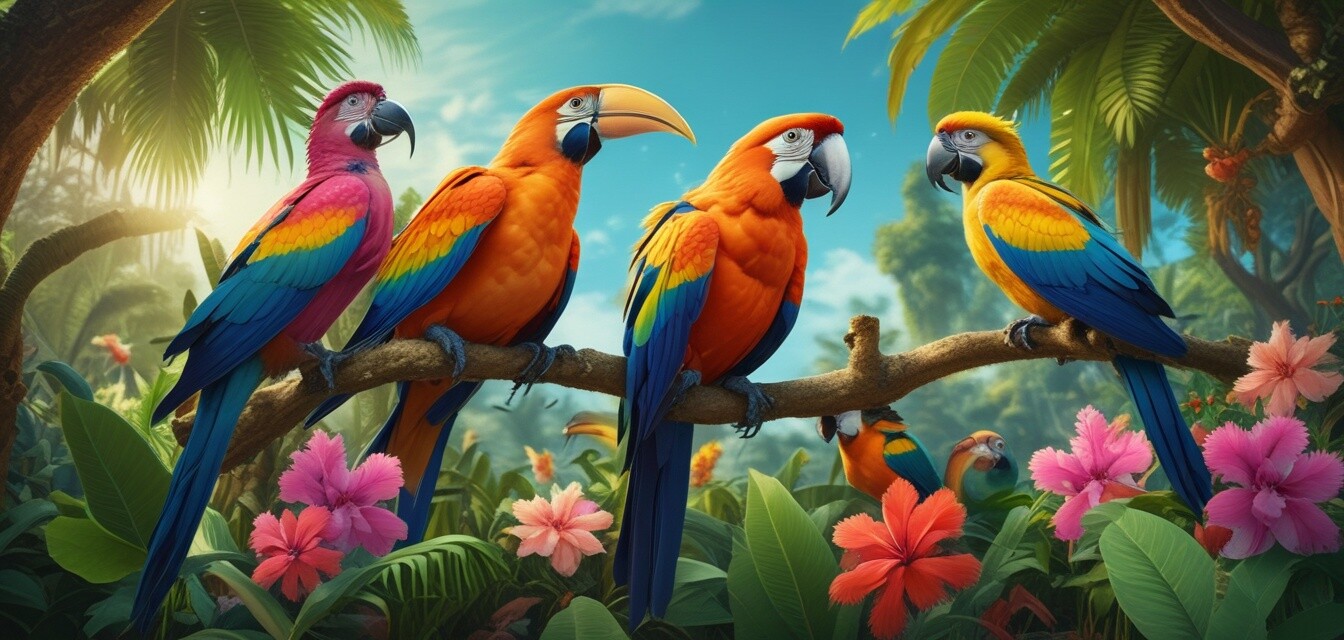
An Insight into Exotic Birds and Their Habitats
Exploring the colorful world of exotic birds opens up a variety of interesting facts and care insights. In this article, we will delve into different exotic bird species and discuss the unique habitat considerations essential for their optimal care and well-being.
Key Takeaways
- Exotic birds require specialized habitats to thrive.
- Understanding species-specific needs is critical for their care.
- Enrichment activities play a significant role in their happiness.
- A proper diet is essential for their health and longevity.
- Regular healthcare checks ensure a happy life.
Understanding Exotic Birds
Exotic birds, known for their stunning colors and vibrant personalities, are popular among bird enthusiasts. These birds include species like parrots, finches, and canaries, each bringing unique quirks and charm.
Types of Exotic Birds
| Species | Size | Common Colors | Typical Lifespan |
|---|---|---|---|
| Macaw | Large | Blue, Green, Yellow | 50-80 years |
| Finch | Small | Mixed | 5-10 years |
| Canary | Medium | Yellow, Red, Orange | 10-15 years |
Habitat Considerations for Exotic Birds
When providing an environment for exotic birds, consider their natural habitat, diet, and social needs.
Essential Habitat Features
- Size: The cage should be spacious enough to allow for flying and movement.
- Perches: Include various perches of different sizes and materials to promote foot health.
- Enrichment: Toys and puzzles enrich their environment and mental health.
- Temperature: Maintain a comfortable range based on the species’ natural habitat.
Indoor vs. Outdoor Habitats
While some exotic birds thrive indoors, others benefit from outdoor aviaries, providing them with natural sunlight and fresh air. However, safety from predators and secure enclosures are essential.
| Feature | Indoor Habitat | Outdoor Habitat |
|---|---|---|
| Protection from predators | High | Medium |
| Natural sunlight | Limited | High |
| Environmental control | High | Variable |
Socialization and Interaction
Exotic birds are social creatures that benefit from interaction with other birds and their human caregivers. Regular engagement fosters happiness and reduces anxiety.
Pros
- Vibrant colors add beauty to your home.
- They can be trained to interact and mimic sounds.
- Enhances your knowledge of wildlife and caring for animals.
Cons
- Require significant time and commitment.
- Potential for noise, particularly larger species.
- Specialized care needs can be costly.
Dietary Needs of Exotic Birds
The diet of exotic birds varies greatly between species. While some thrive on seeds, others need a diet rich in fruits, vegetables, and formulated pellets. Providing a balanced diet is crucial for their overall health.
Common Dietary Requirements
- Seeds: Good source of energy but should be balanced with other foods.
- Fresh Fruits and Vegetables: Essential for vitamins and nutrients.
- Pelleted Diets: Often balanced and formulated for specific species.
Staying Updated on Trends
Staying informed on the latest trends in exotic bird care ensures you're providing the best for your feathered friends. Regularly check our blog for updates and articles on bird health and care, engaging topics in cage bird news, and comprehensive buying guides to help navigate the best products for your birds.
Conclusion
Providing the best care for exotic birds involves understanding their unique habitat requirements and catering to their specific needs. By creating an enriching environment and maintaining a proper diet, you can ensure a happy and healthy life for your cage birds. Keep learning, stay updated on trends, and enjoy the captivating world of exotic avian companions!